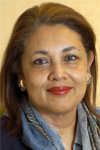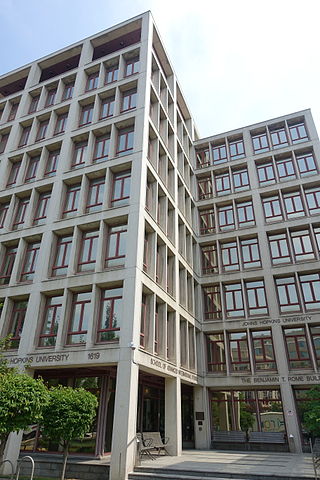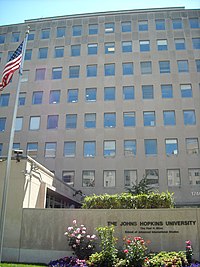
The Princeton School of Public and International Affairs is a professional public policy school at Princeton University. The school provides an array of comprehensive coursework in the fields of international development, foreign policy, science and technology, and economics and finance through its undergraduate (AB) degrees, graduate Master of Public Affairs (MPA), Master of Public Policy (MPP), and PhD degrees.

Paul Henry Nitze was an American businessman and government official who served as United States Deputy Secretary of Defense, U.S. Secretary of the Navy, and Director of Policy Planning for the U.S. State Department. He is best known for being the principal author of NSC 68 and the co-founder of Team B. He helped shape U.S. Cold War defense policy over the course of numerous presidential administrations.

Shirin R. Tahir-Kheli is an American political scientist who also served in the Department of State. In 2006, she was appointed as the first Ambassador for women's empowerment by the United States Secretary of State Condoleezza Rice as well as Senior Advisor to the Secretary of State on United Nations Reform. She was sworn in as the First American Muslim Ambassador in July 1990. Dr. Tahir-Kheli was the Special Assistant to the President and Senior Director for Democracy, Human Rights and International Operations at the White House National Security Council, from 2003-2005. She has served three Republican presidential administrations since 1980.

The School of International and Public Affairs (SIPA) is the international affairs and public policy school of Columbia University, a private Ivy League university located in Morningside Heights, Manhattan, New York City. SIPA offers Master of International Affairs (MIA) and Master of Public Administration (MPA) degrees in a range of fields, as well as the Executive MPA and PhD program in Sustainable Development.

Esther Diane Brimmer is an American foreign policy expert and former Assistant Secretary of State for International Organization Affairs. In June 2013, she left her post as Assistant Secretary and returned to academia.
Riordan Roett is an American political scientist specializing in Latin America. He received his B.A. and Ph.D. from Columbia University in political science and was a post-doctoral fellow at the Massachusetts Institute of Technology. He was assistant professor (1967–1973) and acting director of the Center for Latin American Studies at Vanderbilt University and was the Sarita and Don Johnston Professor of Political Science and Director of the Western Hemisphere Program at the Johns Hopkins University's Paul H. Nitze School of Advanced International Studies (SAIS) in Washington, D.C. until 2018. He is now Professor and Director Emeritus of Latin American Studies Program at Johns Hopkins SAIS.

The Elliott School of International Affairs is the professional school of international relations, foreign policy, and international development of the George Washington University, in Washington, D.C. It is highly ranked in international affairs and is the largest school of international relations in the United States.

James Braidy Steinberg is an American academic and political advisor, and former United States deputy secretary of state. He has served as the dean of the Paul H. Nitze School of Advanced International Studies (SAIS) at Johns Hopkins University since November 1, 2021. Prior to his deanship, he was a professor at the Maxwell School of Citizenship and Public Affairs at Syracuse University
Marisa Linois an Italian-born American retired diplomat who served as the U.S. Ambassador to Albania between 1996 and 1999.
The Johns Hopkins University SAIS Europe in Bologna, Italy, is the European campus of the Paul H. Nitze School of Advanced International Studies (SAIS), a division of Johns Hopkins University located in Washington, D.C. SAIS degree programs emphasize international economics, international relations, EU policy and global risk with options to specialize in a broad range of other policy areas and geographic regions.

The Hopkins–Nanjing Center, formally the Johns Hopkins University–Nanjing University Center for Chinese and American Studies, is an international campus of the Paul H. Nitze School of Advanced International Studies and a joint educational venture between Johns Hopkins University and Nanjing University that opened in Nanjing, China, in 1986. The center aims to produce graduates who will go on to play an important role in developing the U.S.-China relationship.
Sally Angela Shelton-Colby is an American diplomat. She was Ambassador of the United States to Barbados, Grenada and Dominica as well as Minister to St Lucia, and Special Representative to Antigua, St. Christopher-Nevis-Anguilla, and St. Vincent from 1979 to 1981, under Jimmy Carter.
The Central Asia-Caucasus Institute or CACI was founded in 1996 by S. Frederick Starr, a research professor at Johns Hopkins University's School of Advanced International Studies. He has served as vice president of Tulane University and as president of Oberlin College (1983–1994) and the Aspen Institute. He has advised three U.S. presidents on Russian/Eurasian affairs and chaired an external advisory panel on U.S. government-sponsored research on the region, organized and co-authored the first strategic assessment of Central Asia, the Caucasus and Afghanistan for the Joint Chiefs of Staff in 1999, and was involved in the drafting of recent U.S. legislation affecting the region.
The Fletcher School of Law and Diplomacy is the graduate school of international affairs of Tufts University, in Medford, Massachusetts. Fletcher is one of America's oldest graduate schools of international relations. As of 2017, the student body numbered around 230, of whom 36 percent were international students from 70 countries, and around a quarter were U.S. minorities.
The US–China Education Trust is a non-profit organization based in Washington D.C. Founded in 1998 by Ambassador Julia Chang Bloch, the first Chinese-American U.S. Ambassador, USCET seeks to promote China–United States relations through a series of education and exchange programs. The organization sponsors a variety of fellowships, conferences, workshops and exchanges, focused primarily on strengthening Chinese academic institutions related to the fields of American Studies, Media and Journalism, American Governance, and International Relations.
The International Peace and Security Institute or IPSI is a division of Creative Learning an international nonprofit organization with 501(c)(3) status headquartered in Washington, D.C. Founded in 2009, IPSI was acquired by Creative Learning in November 2016. The Institute's objective is to train young peacebuilding and International Justice leaders in the skills needed to effectively intervene in violent conflict scenarios in pursuit of sustainable peace.

The Foreign Policy Institute (FPI) is an American research center based at The Johns Hopkins University's Paul H. Nitze School of Advanced International Studies (SAIS) in Washington, D.C., United States. The Institute, referred to as FPI, is housed in the Benjamin T. Rome building on the Embassy Row in Washington, D.C. FPI organizes research initiatives and study groups, and hosts leaders from around the world as resident or non-resident fellows in fields including international policy, business, journalism, and academia.

The Foreign Affairs Policy Board is an advisory board that provides independent advice and opinion to the Secretary of State, the Deputy Secretary of State, and the Director of Policy Planning on matters concerning U.S. foreign policy. The Board reviews and assesses global threats and opportunities, trends that implicate core national security interests, tools and capacities of the civilian foreign affairs agencies, and priorities and strategic frameworks for U.S. foreign policy. The Board meets in a plenary session several times a year at the U.S. Department of State in the Harry S. Truman Building.











